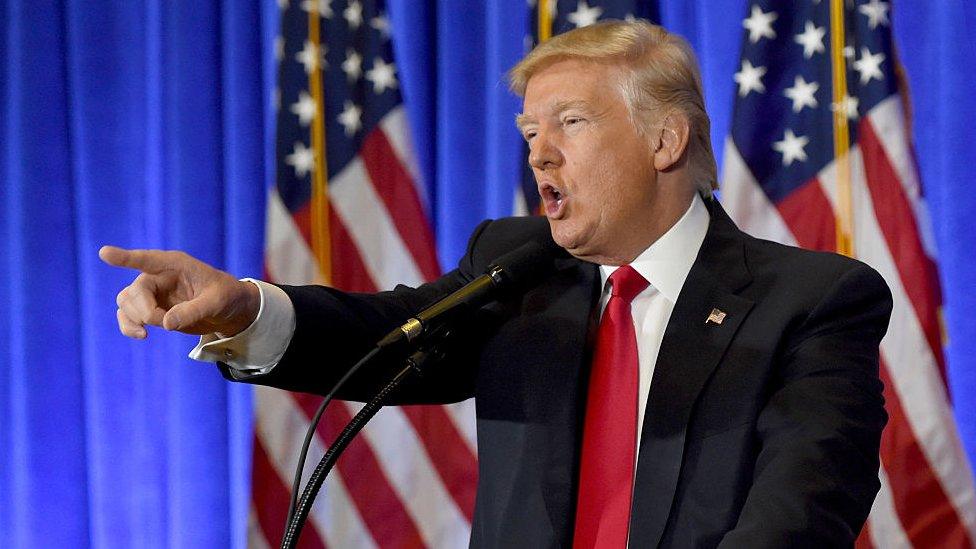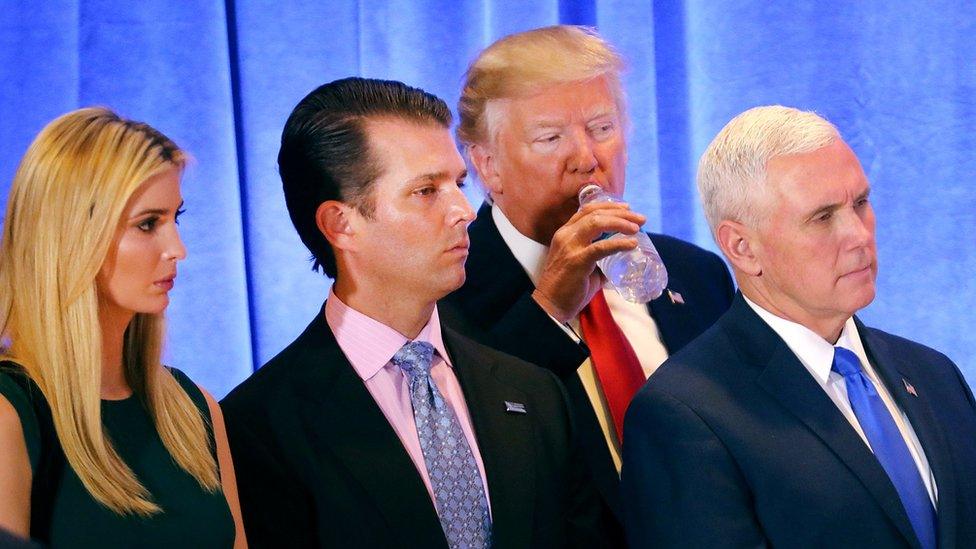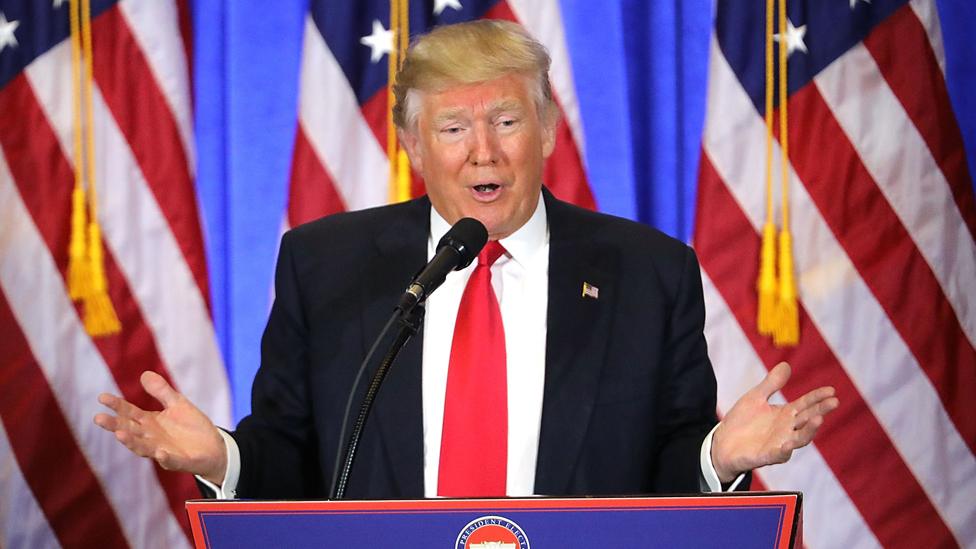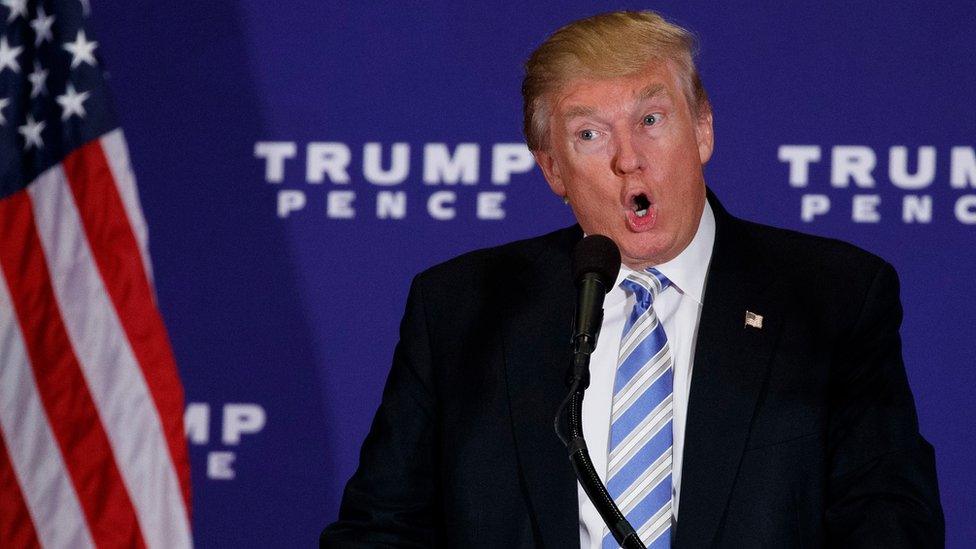Trump press event: A theatre of the absurd
- Published

Donald Trump used to regularly give press conferences. They were free-form events, bits of political performance art that dominated the news and helped the presidential hopeful win the Republican nomination.
The last one came more than five months ago.
That was when Mr Trump urged Russia , externalto hunt down Hillary Clinton's deleted emails. Less than a week before - the day after he accepted the Republican presidential nomination - he went out of the way to belittle, external former Republican presidential opponent Ted Cruz, stepping all over his own post-convention bounce.
It wasn't particularly surprising, then, that the Trump team decided to end the practice, despite the fact that they had spent months mocking Mrs Clinton for her own efforts to avoid media queries.
Candidate Trump would occasionally take questions in small media gaggles or offer one-on-one interviews - usually on Fox News - but the formal, free-for-all style press conferences were a thing of the past.
Now, nine days before his presidential inauguration, the Trump press conference is back - and it turns out he hasn't lost a controversial step. Before getting into the give-and-take with reporters, however, Mr Trump explained why it had been so long.
"We stopped having them because we were getting a lot inaccurate news," he said.
In other words, he was punishing the press for what he saw as unfair treatment. On Wednesday, instead of punishing the press with his absence, he would punish them with his presence.
Mr Trump made a fair amount of news in his press conference - on dealing with his sprawling business empire, his views on Russian hacking and his policy priorities - but the theatre of this press conference became a story in itself.
Just over a week from his inauguration, Mr Trump is still the same man he was on the campaign trail and on the reality show set. The Donald Trump on Wednesday is the Donald Trump who will govern the US, and the theatre of the event is something that will be a part of American lives for the next four years.
Here are a few of the key takeaways.
Beat the press
Mr Trump liked to focus on a key enemy or target of scorn in past press conferences, and Wednesday was no different. He arrived more than ready to air his latest round of grievances. Buzzfeed News - which posted an "intelligence dossier" full of unverified allegations against the president-elect - was a "failing pile of garbage" that is going to "suffer the consequences".
CNN, which published a multi-sourced reported article about the intelligence briefing Mr Trump received based in part on that dossier, is "terrible" and trafficks in "fake news". The president-elect verbally sparred with CNN reporter Jim Acosta, refusing to take his questions.
After the event wrapped up, Acosta said he was berated, external by Trump aide Omarosa Manigualt and told by incoming press secretary Sean Spicer that he would be banned, external from future press conferences if he argued with Mr Trump again.
Donald Trump said the information was 'fake'
The president-elect even took a swipe at BBC News. "That's another beauty", he said when BBC correspondent Ian Pannell introduced himself.
It wasn't all sticks for the president-elect, however. He had a few carrots for media organisations he said were treating him fairly when it came to the latest round of allegations, singling out the New York Times by name (although the Times also listed the sordid details of specific allegations against Mr Trump in one of its news stories).
"I have great respect for the news and great respect for freedom of the press and all of that," Mr Trump said. "But I will tell you, there were some news organisations with all that was just said that were so professional, so incredibly professional, that I've just gone up a notch as to what I think of you."

Friendly voices
Mr Trump also took a few questions from oft-overlooked conservative outlets, such as One America News Network and Breitbart, the alt-right media empire until recently headed by senior Trump advisor Steve Bannon.
Reporter Matt Boyle asked Mr Trump what sort of reforms he might recommend for the media industry given the problems with "fake news". It allowed the president-elect to take a few more swings at the mainstream press - criticising some of the reporters "sitting right in front of us".
"They're very, very dishonest people, but I think it's just something we're going to have to live with," he said. "I guess the advantage I have is that I can speak back. When it happens to somebody that doesn't have that kind of a megaphone, they can't speak back, it's a very sad thing. I've seen people destroyed."

The peanut gallery
During the press conference, Mr Trump would deliver a sharp rebuke and be greeted with applause. Mr Trump would crack a joke followed by laughter. Mr Trump would ask a rhetorical question, and get a chorus of responses.
It was enough to make some viewers wonder whether the normally reserved reporters were throwing their lot in with the soon-to-be president.
In fact, the animated reactions were coming from Trump supporters, political staff and business employees who were crammed into the Trump Tower lobby along with journalists.
Given that Mr Trump seems to draw energy from a welcoming crowd, stacking a press conference with a friendly audience may not be a bad idea from a strategic standpoint. It made for an odd experience when juxtaposed with his sometimes aggressive press questioners - and will be even more peculiar if the practice is continued in the White House briefing room.

Trump the eccentric
Mr Trump says he's "very much a germaphobe".
When confronted by evidence of leaked intelligence, he conducted a mole-hunting investigation within his own organisation.
When he's travelling abroad, he warns everyone with him to be on guard and watch for hidden cameras in hotels.
"In those rooms, you have cameras in the strangest places," he said. "Cameras that are so small with modern technology, you can't see them and you won't know. You better be careful, or you'll be watching yourself on nightly television."
Part of the reason Mr Trump makes for such compelling viewing, is that when he goes off-script, there's no telling where he'll end up - and Wednesday was no different.

Tag-teaming
Another unusual characteristic of this press conference was that Mr Trump was preceded on the stage both by Spicer and Vice-President Mike Pence.
Spicer, who served as Republican National Committee spokesman before joining the Trump transition team, took his own swipes at the media, calling the Russian dossier reports "frankly outrageous and highly irresponsible".
Mr Pence played the disappointed dad.
"You know, I have long been a supporter of a free and independent press, and I always will be," he said. "But with freedom comes responsibility."
Halfway through the press conference, Mr Trump handed the stage over to lawyer Sheri Dillon, who read details of Mr Trump's efforts to avoid charges of conflict of interest from a prepared statement.
Then Mr Trump was back, ready to go a few more rounds with his press antagonists.
- Published12 January 2017

- Published11 January 2017

- Published7 December 2016
- Published22 October 2016
